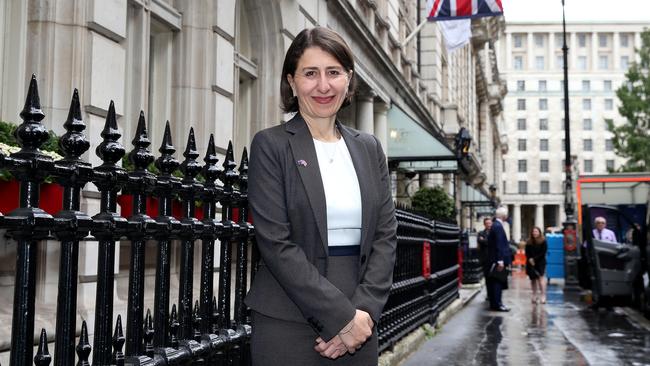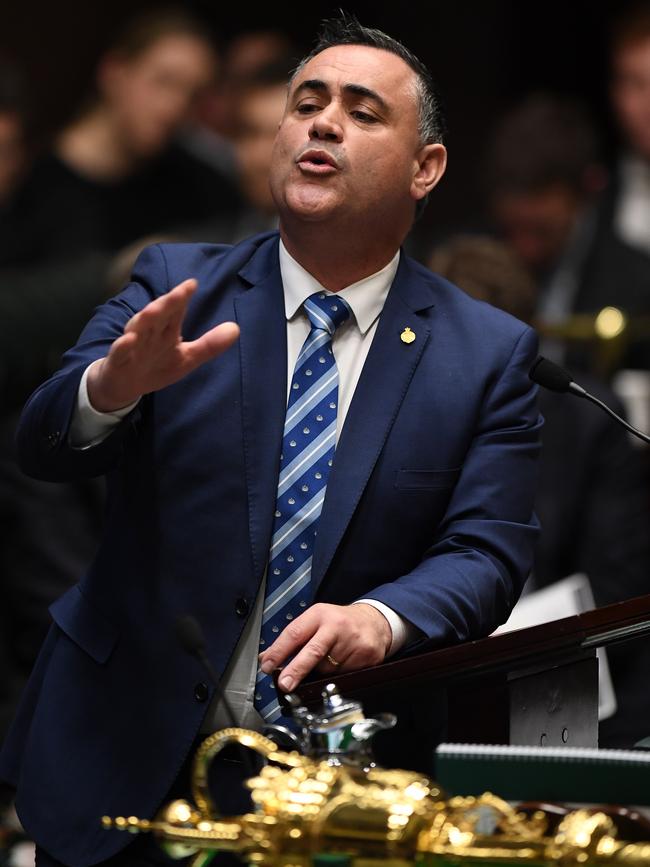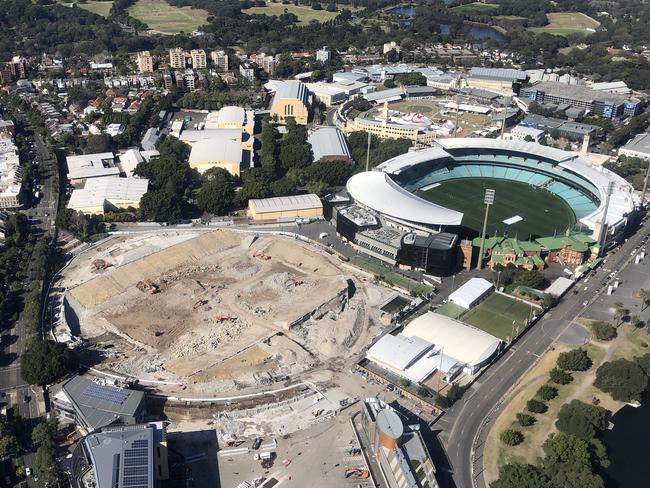Gladys Berejiklian shapes up to beat the premiership blues
The headwinds are rough for NSW leader Gladys Berejiklian.

For a premier who five short months ago won a third Coalition term in Australia’s most populous state for the first time since the 1970s, Gladys Berejiklian is facing a fair set of internal challenges.
The leader of NSW is dealing with a Liberal right flank, including ministers, who became rabid when she shoved independent MP Alex Greenwich’s legislation to decriminalise abortion through the lower house; and a few senior ministers — namely Treasurer Dominic Perrottet, Planning and Public Spaces Minister Rob Stokes and Transport and Roads Minister Andrew Constance — who colleagues say are hoping she retires in two years so they can have a shot at the top job.
John Barilaro has revealed he was so annoyed at the Liberals he wanted to stop calling himself Deputy Premier. It sounded subservient, the Nationals leader complained.
With her backing of the abortion laws, Berejiklian seems to have set off a time bomb in the NSW Liberal Party that never seems to stop ticking — the hatred shared between conservatives and moderates.

As a former parliamentary leader of the moderates, Berejiklian endures the same kind of vulnerability as former Coalition prime minister Malcolm Turnbull: — the second she is seen to underperform, the Right prepares to detonate.
With only a two-seat majority, she is under suspicion of doing a deal with Greenwich on the abortion bill lest a couple of by-elections send her to minority government. She denies that theory. Some fear resignations from Liberals such as MP Kevin Conolly will enlarge the crossbench.
On her terms
Yet it was an upbeat if jet-lagged Berejiklian who sat down with The Australian at a London hotel this week during her trade mission. Despite the early drama in a term many thought would involve little more than opening controversial infrastructure projects and watching voters finally enjoying their existence, Berejiklian confirms that she wants a shot at the 2023 election. Asked if the early “headwinds” have sparked doubts about pushing on, the Premier laughs.
“There always are (headwinds). That’s normal,” she says.
Berejiklian says she would be “disappointed” if some colleagues did not have their sights on her job. “Competition is healthy,” she says.
But she vows to complete her term, which would make her the longest serving premier since Bob Carr — at six years to the former Labor leader’s 10. (Barry O’Farrell, Mike Baird and Morris Iemma all served for about three years).
“Money has never motivated me and I think I’ve got the best job in the world,” Berejiklian explains in countering speculation that she will return to life as a banking executive, as Baird did. “I appreciate people always assume that I want to go into the private sector and make lots of money but that doesn’t motivate me.”
Asked whether her senior colleagues should just park their ambitions, she mentions the possibility of four Coalition terms, matching the stint Labor enjoyed from 1995 to 2011. She merely hints at mid-term retirement.
“If we keep working hard and keep our heads down, I actually think we’ve got another two terms in us. So that’s opportunities for lots of people down the track.
“I put 110 per cent into the job. It’s the best job I’ll ever have and I actually think being a premier of Australia’s largest state also gives you a wonderful opportunity to be close to the people.”
Scandals erupt
The task ahead is bigger than the politics within her party. The term started with a scandal involving the private sharing of data by the office of Customer Service Minister Victor Dominello, a Berejiklian confidant.
More than 100 motorists were caught up in that scandal, an unsuccessful attempt to ensnare former Labor leader Michael Daley during the campaign leading up to the March 23 election.
A government report later revealed that successive Nationals ministers had allowed water to be taken from the Barwon-Darling river system, sending western NSW into drought three years earlier than it would otherwise have been.
Then the government had to cut ties with its construction contractor for the controversial new Allianz Stadium redevelopment after Lendlease said the project would cost more than the Berejiklian regime promised at the election — $729 million.
Now Berejiklian, who mystified colleagues after the election by saying she suddenly wanted to implement social reforms, has bought herself a world of Liberal pain on abortion laws.
Apart from right and centre-right ministers, even the moderate Attorney-General Mark Speakman and Stokes voted against the Premier on the legislation. It passed the lower house not because of her own Liberals, who voted against it 19-14, but thanks to Labor, the Nationals and Greens.
Berejiklian, who confirms to The Australian that she has always been pro-choice, says she feels a “broader responsibility” to act on the issue with MPs from all sides, including Greenwich, pushing for it to be dealt with for years.
Indeed, she candidly admits she waited until after the election to allow it to be debated because it was so contentious. “If anything, I kept kicking it down the road,” she says. “They’ve been pushing this for years … How could I, as the first elected female Liberal premier, not think it’s an important issue for women? Overwhelmingly in the community people don’t want to see it in the Crimes Act.”
The legislation still has to pass the upper house next week.
Killing euthanasia debate
Perhaps chastened by the amount of internal division the matter has caused, including Counter-Terrorism and Corrections Minister Anthony Roberts and Police and Emergency Services Minister David Elliott sounding off while she is in London, the Premier admits she is in no hurry to allow the parliament to debate euthanasia as well.
“Conscience votes are very difficult and I don’t have an appetite for many of them,” she says. “A strong economy, a strong budget, a strong infrastructure program and service delivery are always a priority. They’re my strengths. That’s stuff I’m comfortable with.
“I’m not comfortable in the social issues space. It’s not me, but I feel I’ve got a broader responsibility on some issues. It’s a question of whether you think it (abortion) should sit in the Crimes Act or not.
“South Australia did it (decriminalised it) half a century ago. All the other states have done it, but I do appreciate for some people it’s a deeply emotional issue and for some people because of their faith they’d never support abortion, and I understand that.
“I wouldn’t want to force anyone as a government member to vote for anything … religious freedom’s important to me. I’m someone of faith. I’m not someone who talks about it but I reconcile my faith with my position. It’s for the next generations. Irrespective of my views, you need to make sure women have decisions with themselves, but all of us would argue abortion should be rare.
“I don’t think it’s appropriate for NSW to be the only state to have it in the Crimes Act. I’m very comfortable with the fact that depending on members’ electorates, depending on their views, they were able to vote freely.”
One issue that has blown up in the detail is whether gender selection leads to abortions. As one of four girls, Berejiklian insists the chief obstetrician advises there is no evidence this is occurring and the legislation includes a provision that the secretary of Health will review this aspect of its operation.
Stadium row builds

Berejiklian has been questioned relentlessly about abortion during her London visit, when she was hoping to change the subject to NSW’s strong economy and trade opportunities.
Her internal critics would argue that such issues take hold when a leader lacks a narrative. Berejiklian tells The Australian of two priorities — getting on with the western Sydney aerotropolis and selling more assets to build yet more infrastructure.
But the headwinds remain. It seems unusual that Jobs, Investment Tourism and Western Sydney Minister Stuart Ayres is on the Premier’s trip to Britain and Germany rather than Barilaro, the Regional NSW, Industry and Trade Minister. This seems more evidence of Liberal-Nationals tension.
“As the Deputy Premier, he’s got to keep the home fires burning, so it’s very rare to have both of us out of the state at the same time and Minister Ayres is the minister for the aerotropolis, so it makes perfect sense,” Berejiklian says.
She adds: “The DP and I have an extremely healthy respect for one another. We get each other, we support each other, and I think NSW is going to see a lot of very great things in the next few years because of it.’’
There is also the issue of stadium builds and whether the costs will blow out. Berejiklian insists that the Sydney Football Stadium will be rebuilt within the $729m window promised.
“That’s what we went to the people with ($729m) and the government is confident that we will be able to get a world-class stadium within that envelope.
“We’ve got two very good bidders in the field, so by the end of the year we’ll have a formal contract in place.”
The future holds a raft of challenges, but Berejiklian wants the world — and particularly her colleagues — to know she intends to be around for a while. They’d better accept that.




To join the conversation, please log in. Don't have an account? Register
Join the conversation, you are commenting as Logout